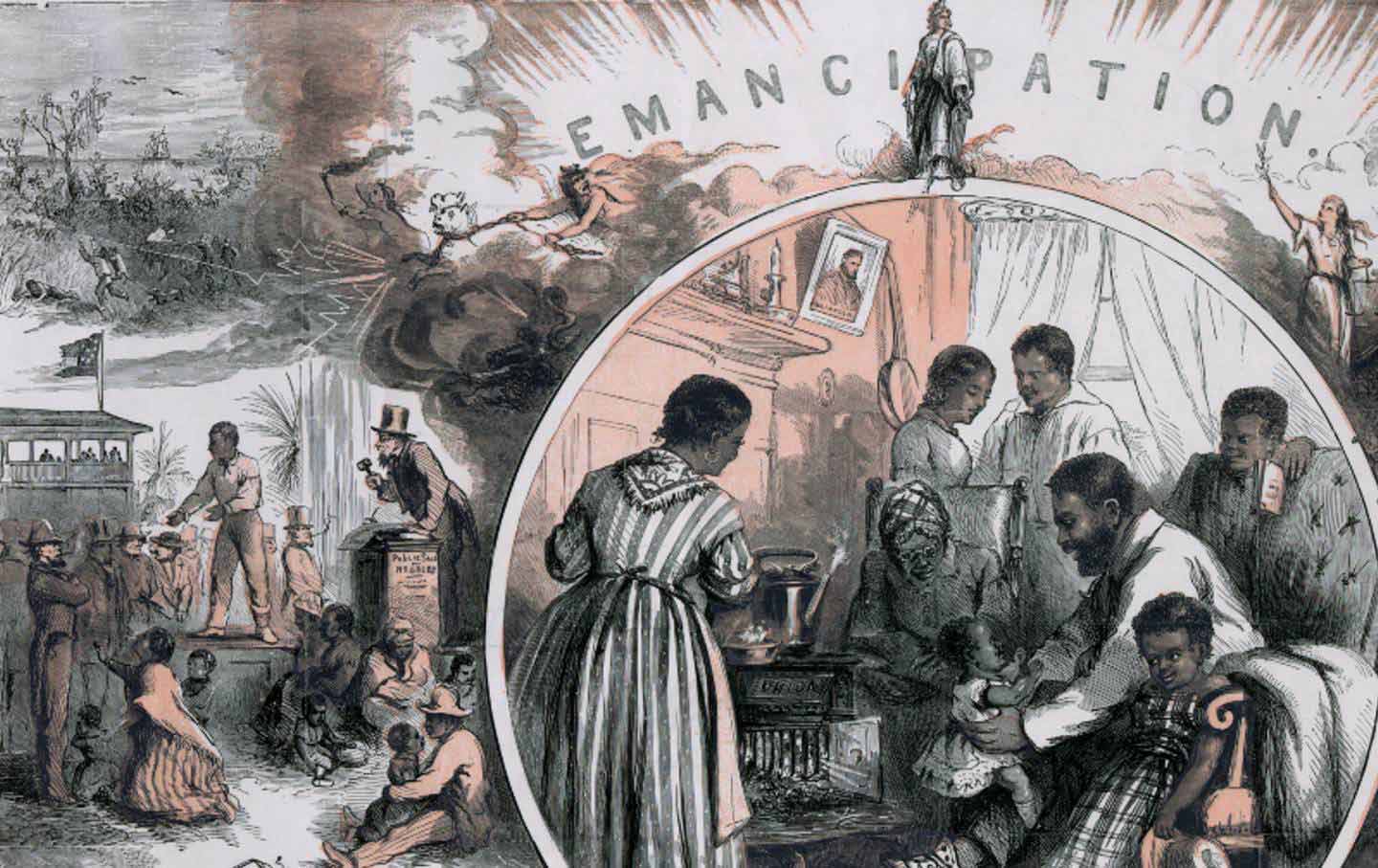Courts Clash Over Texas’s Draconian Immigration Law
After a Supreme Court ruling reversed a stay on the controversial SB 4 bill, the Fifth Circuit Court of Appeals promptly reinstated it.

Supreme Court Associate Justices Brett Kavanaugh and Amy Coney Barrett talk before President Joe Biden’s State of the Union address in February 2023.
(Chip Somodevilla / Getty Images)For a few hours on Tuesday evening, we got an advance glimpse of the sort of dystopian and deranged border surveillance state the Trump campaign is determined to institute, when the US Supreme Court reversed a stay on the draconian Texas immigration law known as SB 4. The US Court of Appeals for the Fifth Circuit, which oversees Texas, Louisiana, and Mississippi, had put a hold on Texas Governor Greg Abbott’s bid to usurp federal authority over immigration enforcement. The subsequent Supreme Court ruling proved short-lived when the Fifth Circuit reinstated its stay late last night. The core disputes over the law’s effort to arrogate the powers of immigration enforcement from the federal government to the states still await resolution after this murky set of procedural decisions.
The high court’s decision to strike down the stay, like similar high court rulings involving an emergency appeal, didn’t include a formal opinion from Associate Justice Samuel Alito, who oversees the Fifth Circuit. But Justice Amy Coney Barrett submitted a concurring opinion, also endorsed by Justice Brett Kavanaugh. In that ruling, Barrett rather confusingly maintained that the high court was overriding the stay for purely procedural reasons. It was not a traditional suspension of the law pending an appeal, she argued, but rather a “temporary administrative stay” that was part of the Fifth Circuit’s “exercise of its docket-management authority.” Rough translation: Barrett—and Kavanaugh, by extension—isn’t yet prepared to weigh in on the merits of the Texas law.
The Fifth Circuit promptly disregarded Barrett’s opinion and reinstated the stay pending arguments in the challenge to the Texas law, forcing Texas to hit the brakes on enforcing the measure until the Fifth Circuit rules on the challenge next month.
Still, all this protracted jousting over temporary stays is worrisome, since, as my Nation colleague Elie Mystal has argued, the unconstitutional nature of SB 4’s provisions is blindingly self-evident. The law directs Texas state courts to oversee deportations, and state police to detain and arrest immigrants, among other basic operations of border enforcement that have fallen clearly under federal jurisdiction for more than a century. American officials were reminded of how extreme the law’s power grab was when their Mexican counterparts announced that they would not “under any circumstances” accept any migrants deported by Texas after the law’s brief reinstatement. (A separate high court stay on another provision of the law, which had state officials erecting barbed wire barriers at the federal installation at Eagle Pass, a Texas border site, remains in place, at least for now.)
In its abrupt revocation of the original Fifth Circuit stay, the Roberts court appeared yet again to be telegraphing its ideological sympathies for hard-right lawmaking and legal activism—with Barrett’s concurrence perhaps keeping the door open for the court to strike down the central provisions of the Texas law when it inevitably comes in for review. “Barrett’s opinion has huge analytical holes—it’s sort of existing in an abstract world, as opposed to a world that has the Fifth Circuit in it,” says University of Texas Law professor Stephen Vladek, who holds the Charles Alan Wright Chair in Federal Courts at the University of Texas School of Law. “But at the same time, it’s clearly leaving room for Barrett, and possibly Kavanaugh, to block SB 4.”
For a court that’s already rolled back fundamental federal protections in the spheres of ballot access, bodily autonomy, regulatory policy, and church-state separation, the dismantling of federal authority in immigration law could be the next frontier—particularly since the central judicial player here is the Fifth Circuit, the country’s most notorious hard-right appellate jurisdiction. With an energetically activist panel of judges reversing key protections of voting rights and severely curtailing access to the abortion drug mifepristone, it requires no great stretch to see the Fifth Circuit siding with GOP Texas Governor Greg Abbott, who contends that Texas has the right to eclipse federal jurisdiction over immigration on the basis of a constitutional clause permitting such measures if a state is directly invaded.
This week’s procedural maneuvering over SB 4 sets the stage for an eventual high court challenge to the law, which—should it go in Texas’s favor—could reverse a century’s worth of precedent upholding federal sovereignty in immigration enforcement. In 2012, a 5-3 majority struck down state-enforcement prerogatives in a similarly draconian Arizona law, again affirming that the Constitution’s supremacy clause gave the federal government clear jurisdiction in matters of border enforcement. A decision in Texas’s favor would not only reward demagogues like Abbott, who’s fond of invoking Confederate rhetoric in dramatizing the border “invasion” he’s directing Texas state officials to repel; it would also create a race to the bottom in GOP-led border states keen to deprive migrants of basic human rights, via stunts such as the forced relocation of migrants to blue-state jurisdictions. And as a matter of testing constitutional restraint, “the Texas law goes so much further than the Arizona one did,” Vladek says. “One of the problems the court will be facing is not just the invasion theory—it’s the notion that the state can have what is effectively its own immigration court system.”
That issue has already drawn the attention of other Supreme Court judges. As Justice Sonia Sotomoyer wrote in a dissent from the lifted stay, “Texas passed a law that directly regulates the entry and removal of noncitizens and explicitly instructs its state courts to disregard any ongoing federal immigration proceedings. That law upends the federal-state balance of power that has existed for over a century, in which the national government has had exclusive authority over entry and removal of noncitizens.”
However the court resolves the disputes over SB 4, the test case leaves the forces of humane, constitutional, and coherent governance in a sickeningly familiar position: passively awaiting a diktat from a disengaged, black-robed Politburo, and without any long-term plan to shift the relevant balance of power. Like the catastrophic voting rights, federal regulatory, and abortion decisions preceding it, this case drives home the urgent imperative to take up the long-neglected cause of serious court reform. As the Roberts court secures unrivaled and expansive authority over a vast range of issues, it’s poised to realize the central goal of the legal right: to override the core directives of the “administrative state” by means of a frontal attack on its ability to function.
This mission has driven legal activism on the right for the past four decades—and the liberal response has been to continue meekly deferring to the bogus authority of the Supreme Court as a super legislature. While Biden and other Democratic leaders call out individual decisions from the Roberts court, they have adopted no serious strategy to reverse its ideological impunity. That’s why Democratic pledges to reinstate Roe v. Wade as congressional legislation amount to a holding maneuver, given the virtual certainty that the high court would strike down any such law. With judges like Alito and Clarence Thomas gleefully advertising their hard-right political and cultural allegiances and engaging in the sort of cronyist corruption that would make Boss Tweed and his coterie of Tammany Hall insiders blush, the case for either stacking the court—or, far more preferably, drastically limiting its jurisdiction—is unassailable. Yet President Joe Biden and Democratic leaders refuse to face the crisis head-on, suggesting that such basic reforms would “politicize” basic court operations—even though the Supreme Court has been a political institution throughout its history, and most of the time a deeply reactionary one. The American right long ago made its peace with these basic truths, and via a historic mobilization of money, legislative clout, and intellectual influence produced the calamity known as the Roberts court. As the coming high-stakes battle over immigration shows in no uncertain terms, it’s long past time for liberals to start responding in kind.
We cannot back down
We now confront a second Trump presidency.
There’s not a moment to lose. We must harness our fears, our grief, and yes, our anger, to resist the dangerous policies Donald Trump will unleash on our country. We rededicate ourselves to our role as journalists and writers of principle and conscience.
Today, we also steel ourselves for the fight ahead. It will demand a fearless spirit, an informed mind, wise analysis, and humane resistance. We face the enactment of Project 2025, a far-right supreme court, political authoritarianism, increasing inequality and record homelessness, a looming climate crisis, and conflicts abroad. The Nation will expose and propose, nurture investigative reporting, and stand together as a community to keep hope and possibility alive. The Nation’s work will continue—as it has in good and not-so-good times—to develop alternative ideas and visions, to deepen our mission of truth-telling and deep reporting, and to further solidarity in a nation divided.
Armed with a remarkable 160 years of bold, independent journalism, our mandate today remains the same as when abolitionists first founded The Nation—to uphold the principles of democracy and freedom, serve as a beacon through the darkest days of resistance, and to envision and struggle for a brighter future.
The day is dark, the forces arrayed are tenacious, but as the late Nation editorial board member Toni Morrison wrote “No! This is precisely the time when artists go to work. There is no time for despair, no place for self-pity, no need for silence, no room for fear. We speak, we write, we do language. That is how civilizations heal.”
I urge you to stand with The Nation and donate today.
Onwards,
Katrina vanden Heuvel
Editorial Director and Publisher, The Nation








